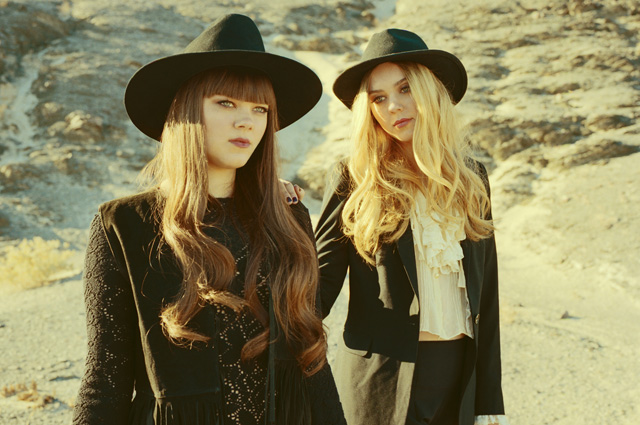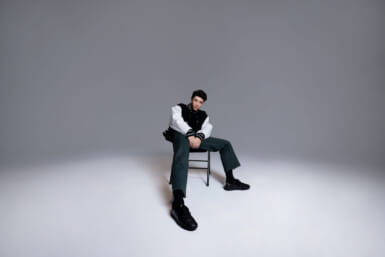Most siblings squabble endlessly, but Klara and Johanna Söderberg harmonize in every sense of the word. The acclaimed Swedish indie folk duo—who have dubbed themselves First Aid Kit — aren’t just simpatico in the studio, where their vocals dovetail with a bittersweet, late summer breeziness. Their lyricism, career goals and creative influences are equally synchronized. But that doesn’t mean the endless hours they’ve shared in rehearsal, on the road and on stage (including a stop at this year’s Fuji Rock festival) haven’t been occasionally trying.
By Kyle Mullin
“We’ve always bonded because we have the same interests,” Johanna—who, at 23, is the elder sibling—says of the deep ties she shares with her sister, during a post-performance interview at Fuji Rock last Friday. But Johanna adds that their endless gigging can often leave the pair weary of one another: “We’ve always been best friends, more like twins than ‘little sister’ and ‘big sister.’ We don’t have those conventional roles quite so much. But we do get tired of each other.”
Klara—aged 20, who has a slightly higher voice than Johanna’s, and a penchant for finishing her sister’s sentences—immediately chimed in about how the Söderbergs occasionally bicker while touring the world: “That would happen if you spent this much time with anyone. We need to feel that we have something else, that we do our own things.”
Johanna agrees that those separate interests offer the siblings a needed reprieve. She points to her love of languages and her affinity for Asian culture as a distinction from her sister. Indeed, Johanna was thrilled to perform at Fuji Rock last week in part because she has studied Japanese for years, ever since she first started singing along to Hamasaki Ayumi as a ten-year-old.
“I loved J-pop so much that I’d start reading the translations (of the lyrics), and that made me want to study Japanese. I only listened to the really, really mainstream stuff,” Johanna says with a laugh, adding that Klara enjoyed it as well, but not to nearly the same degree. “I just thought it was very different from what was popular in Sweden. I thought it was interesting, and very cute.”
Klara concedes that such differing fixations give the girls some needed space, but cautions that their musical dynamic is far from dysfunctional. If anything, the close quarters they inhabit while recording, touring and performing have only strengthened their ties. Johanna says this was especially the case as she and Klara shot to indie rock fame and acclaim after their cover of “Tiger Mountain Peasant Song,” (a tune by one of their favourite bands, Fleet Foxes) became a viral Youtube hit, with 3,943,455 views and counting. At the time First Aid Kit was already signed to Swedish label Rabid Records, home of other soon-to-be-lauded acts like The Knife (whose front woman, Karin Dreijer Andersson, was coincidentally a kindergarten classmate of Klara and Johanna’s little brother). But the Söderbergs’ careers had slowly been percolating for years before that. Klara had been writing songs since she was 13, and she and Johanna began performing regular small gigs together less than a year later. They released their debut EP, Drunken Trees, in 2008, and made their first TV appearance on national Swedish television shortly afterward.
But their viral video took the Söderbergs career to the next level—especially after Robin Pecknold, the Fleet Foxes frontman who penned the song that Klara and Johanna so affectionately covered—reposted the clip on his MySpace page, introducing First Aid Kit to alt-folk fans around the world. Viewers were won over by the Swedish pair’s sweetly subtle rendition, which featured Klara on guitar and Johanna leaning back to hit a particularly high note, as they both stifle endearing giggles. Indeed, the pair’s disarming personality put a whole new twist on the tune.
The siblings have been working together constantly ever since, and Johanna reiterates that it can occasionally be annoying, but it has deepened their relationship overall.
“We started so young, 14 and 16, so there’s been a lot of pressure, being in the limelight at that age,” Johanna says. “We tackled that together, and I think that makes our bond even stronger.”
She goes on to add: “When you start out, and you’re not used to having people write about you, and having expectations, that’s really tough. Especially at that age, you’re very vulnerable—”
Klara then cuts her sister off, saying: “And being judged, really. That’s a scary thing, being judged in the public eye. It’s really strange…”
As Klara trails off, Johanna finishes the thought: “And luckily, we have each other to help each other out. When we do interviews, when we’re onstage, if one of us isn’t feeling so good on a day, the other one will take over more, and balance it out.”
It was crucial for the Söderbergs to be so compatible, because their success did indeed come in an overwhelming whirlwind. An American label re-released their debut EP in 2009 after their Fleet Foxes cover went viral. Within months they were performing onstage with Pecknold and his band, before being invited by White Stripes frontman Jack White to record a single for his renowned Third Man Records series. But First Aid Kit’s biggest breakthrough of all came when they met another indie rock legend—Conor Oberst, frontman of the alt-folk outfit Bright Eyes, the band that had inspired Klara to sing and write in the first place.
“His music definitely helped me through some teenage angst,” Klara says. She also says that it was a dream come true to write and record the First Aid Kit song “King of the World,” with Oberst. “It’s really incredible to get to collaborate with someone who has meant that much to you and inspired you that much.”
The Söderbergs say Oberst’s tutelage has been indispensable. After meeting him backstage at a Monsters of Folk concert in 2009, he went on to introduce the pair to his Bright Eyes bandmate Mike Mogis, who produced 2012’s The Lion’s Roar (the disc that features “King of the World,”) and their follow up release, 2014’s Stay Gold.
Johanna says she not only cherishes Oberst’s advice, but also his willingness to hear her insights: “He’s so humble and honest. And he really listens to us. We have conversations; I can feel that he really cares about us. That was an amazing thing to discover. Also he uses a lot of hip-hop slang, like ‘Yo yo,’ when he greets us. So that was also really surprising.”
But First Aid Kit’s biggest mentor wasn’t anyone nearly as hip as Oberst. The one anchor—whom the sisters have steadfastly depended on throughout their success and years prior to it—has been their father, Benkt Svensson. His years of experience as a schoolteacher have been invaluable, especially after the girls dropped out to focus on their world tours. But his most crucial insight stems from his earlier profession, as guitarist for the Swedish rock outfit Lolita Pop, whose heyday was in the 80s.
“He’s been really supportive, and given us so much advice, especially when we were starting out,” Johanna says of her father. She explains that he has also provided plenty of practical assistance: “He still does the sound for our shows. He’s a crazy good guitarist, and he plays bass on our records.”
Now that the Söderberg sisters have traversed the globe, impressed their peers and won legions of their own fans, they no longer need to lean on their father or Oberst quite so heavily for support and affirmation. On Stay Gold they sound more self assured than ever. The opening track, “My Silver Lining,” has a sweetly wholesome tone imbedded with haunting melodies—the sound of The Mamas & the Papas going toe to toe with the Manson Family’s menace. On the rollicking, defiantly joyful midway tune “Heaven Knows,” the girls sing with a cheery sneer, as if to taunt their own insecurities:
Expectations of you
Now you prefer this caricature before being true
But you’re better than that…
I know you better than that”
They’ve also worked to attain that subtlety and duality in their delivery, switching up their performance roles, rather than having Klara continue to sing most of the leads.
“On our new records we’ve been doing that a lot,” Klara says of trading singing duties with her sister. “I’m getting more comfortable singing harmonies, and Johanna’s getting more confident about singing lead vocals.”
Johanna says such evolutions are crucial, but not always successful, before adding with a chuckle: “We want to keep this collaboration growing, in the songwriting and the singing, in everything. But the thing is, our voices are so similar that when we switch, people often don’t even notice. So it almost feels kind of pointless.”
Despite those hurdles, Johanna and Klara freely admit that they’ve matured, even since their previous release, The Lion’s Roar, which only hit shelves in 2012. One of its key tracks, “Blue,” features lyrics like:
You thought was gonna marry you
Died in a car accident when he was only 22
Then you just decided, love wasn’t for you
And every year since then
Has proved it to be true…”
Of those lyrics, Klara says: “It’s just about being scared of the future and becoming… lonely, I guess. That song is about this woman who has lost herself—”
“Given up on love,” Johanna interjects.
“Yeah, and is giving up on life in general,” Klara says, adding, a little hesitatingly, that the song is also about: “Just, ya know, us knowing that such loneliness can happen. And hoping it won’t.”
The sisters still ponder that imminent melancholy on Stay Gold’s title track, singing: “But just as the moon it shines straight/So dawn goes down today/No gold can stay.” But, as opposed to “Blue,” the newer tune addresses the theme with less dread and more of a wistful yearning to strive, and endure, for something better. That’s especially evident on “Stay Gold’s” second verse: “But there is only forward, no other way/Tomorrow was your whole bad at the end of the day/And gold turns gray.”
Indeed, Klara and Johanna have now concluded that—regardless of the pressures they face, or the sacrifices their world tours demand—they will never end up like the woman they sing about in “Blue.” They won’t ever feel that vulnerable, because they have each other—along with throngs of fans, who turn to them in the same way that an 11-year-old Klara played Bright Eyes during trying times.
“That’s pretty much why we do what we do. Because that’s what music does for us, it helps us,” Klara says of soothing an audience that dreads the same sort of despair the girls fretted over on “Blue.”
Johanna agrees, adding “If anyone can relate to it in that tiny way, then I think we’ve come far. And we’ll feel less lonely by that as well.”
Kyle Mullin is a roaming rock journalist who has contributed to music mags around the world. You can read his interviews with Iggy Pop, David Byrne and St. Vincent, Brian Wilson, Ai Weiwei and others at kylelawrence.wordpress.com. He spoke with The National and Chvrches for Tokyo Weekender in February and November this year.









